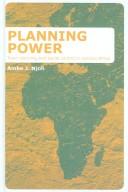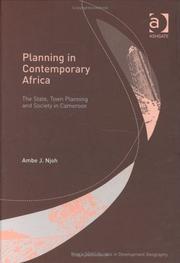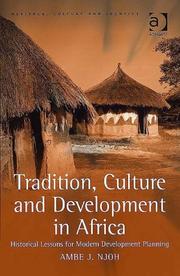| Listing 1 - 10 of 12 | << page >> |
Sort by
|
Book
ISBN: 9781409443186 9781409443193 9781315548777 9781317003625 9781317003632 9781138109209 Year: 2012 Publisher: Farnham Ashgate
Abstract | Keywords | Export | Availability | Bookmark
 Loading...
Loading...Choose an application
- Reference Manager
- EndNote
- RefWorks (Direct export to RefWorks)
Hygiene. Public health. Protection --- Economic geography --- Africa --- Urban health --- City planning --- Public health --- Health aspects --- 711.8 --- 711.164 --- 364.2 --- 711.4 <1-773> --- 628 --- Planologie: openbare nutsvoorzieningen --- Planologie: saneringsplannen --- Bijzondere maatschappelijke problemen --- Gemeentelijke planologie. Stadsplanning. Stedenbouw--Gebieden in ontwikkeling. Ontwikkelingslanden --- Public health engineering. Water. Sanitation. Illuminating engineering --- 628 Public health engineering. Water. Sanitation. Illuminating engineering --- 711.4 <1-773> Gemeentelijke planologie. Stadsplanning. Stedenbouw--Gebieden in ontwikkeling. Ontwikkelingslanden --- 364.2 Bijzondere maatschappelijke problemen --- 711.164 Planologie: saneringsplannen --- 711.8 Planologie: openbare nutsvoorzieningen --- City health --- Urban public health --- Urbanization --- Cities and towns --- Civic planning --- Land use, Urban --- Model cities --- Redevelopment, Urban --- Slum clearance --- Town planning --- Urban design --- Urban development --- Urban planning --- Land use --- Planning --- Art, Municipal --- Civic improvement --- Regional planning --- Urban policy --- Urban renewal --- Government policy --- Management
Book
ISBN: 3319252968 3319252984 Year: 2016 Publisher: Cham : Springer International Publishing : Imprint: Springer,
Abstract | Keywords | Export | Availability | Bookmark
 Loading...
Loading...Choose an application
- Reference Manager
- EndNote
- RefWorks (Direct export to RefWorks)
This book will seek to close the gaps on the role of France in exporting Eurocentric spatial and environmental design principles and practice. It does so by analyzing the major spatial and physical development projects that French colonial authorities implemented in France’s colonial empire and elsewhere from the 15th to the 20th century. French urban planning ideology, principles and practice were not exported exclusively to territories under French colonial suzerainty. Accordingly, the book focuses on major physical and spatial planning schemes inspired by French planning thought in territories without a history of French colonialism.
Anthropogeography & Human Ecology --- Anthropology --- Social Sciences --- Sociology, Urban. --- Urbanization. --- France --- Colonies. --- Urban sociology --- Cities and towns, Movement to --- Urban development --- Urban systems --- Cities and towns --- Social history --- Sociology, Rural --- Sociology, Urban --- Urban policy --- Rural-urban migration --- Environmental management. --- Urban Geography / Urbanism (inc. megacities, cities, towns). --- Environmental Management. --- Environmental stewardship --- Stewardship, Environmental --- Environmental sciences --- Management --- Urban geography. --- Geography
Book
ISBN: 3030397599 3030397580 Year: 2020 Publisher: Cham : Springer International Publishing : Imprint: Springer,
Abstract | Keywords | Export | Availability | Bookmark
 Loading...
Loading...Choose an application
- Reference Manager
- EndNote
- RefWorks (Direct export to RefWorks)
A good understanding of the status quo is necessary for the success of efforts to develop and maintain nature in built space. Accordingly, this book conducts an environmental scan of the context of these efforts in global perspective. In particular, it develops and employs a novel environmental scanning model (ESM) designed to rigorously analyze the political, economic, social, technological, ecological, cultural and historical (PESTECH) contexts of initiatives to promote biodiversity in the built environment. The focus is on four specific substantive areas of environmental policy, namely forestry, water, food, and energy. The units of analysis roughly correspond with the major United Nations Environmental Programme (UNEP) regions of the world, including sub-Saharan Africa, Middle-East and North Africa, Asia and the Pacific, Western Europe, North America, and Latin America and the Caribbean.
Environmental geography. --- Environmental sociology. --- Environment. --- Economic development—Environmental aspects. --- Economic policy. --- Environmental Geography. --- Environmental Sociology. --- Environment Studies. --- Development and Sustainability. --- Development Policy. --- Economic nationalism --- Economic planning --- National planning --- State planning --- Economics --- Planning --- National security --- Social policy --- Environmental sciences --- Environmentalism --- Sociology --- Geography --- Social aspects --- City planning --- Environmental aspects. --- Balance of nature --- Biology --- Bionomics --- Ecological processes --- Ecological science --- Ecological sciences --- Environment --- Environmental biology --- Oecology --- Population biology --- Ecology

ISBN: 1844721604 Year: 2007 Publisher: New York : UCL Press,
Abstract | Keywords | Export | Availability | Bookmark
 Loading...
Loading...Choose an application
- Reference Manager
- EndNote
- RefWorks (Direct export to RefWorks)
City planning --- Colonial cities --- Colonies --- Power (Social sciences) --- Regional planning --- Social control --- History --- Administration --- History
Digital
ISBN: 9783319252988 Year: 2016 Publisher: Cham Springer International Publishing
Abstract | Keywords | Export | Availability | Bookmark
 Loading...
Loading...Choose an application
- Reference Manager
- EndNote
- RefWorks (Direct export to RefWorks)
This book will seek to close the gaps on the role of France in exporting Eurocentric spatial and environmental design principles and practice. It does so by analyzing the major spatial and physical development projects that French colonial authorities implemented in France’s colonial empire and elsewhere from the 15th to the 20th century. French urban planning ideology, principles and practice were not exported exclusively to territories under French colonial suzerainty. Accordingly, the book focuses on major physical and spatial planning schemes inspired by French planning thought in territories without a history of French colonialism.
Environmental protection. Environmental technology --- Environmental planning --- Economic geography --- Geography --- ruimtelijke ordening --- milieubeleid --- geografie --- reizen
Multi
ISBN: 9783030397593 Year: 2020 Publisher: Cham Springer International Publishing
Abstract | Keywords | Export | Availability | Bookmark
 Loading...
Loading...Choose an application
- Reference Manager
- EndNote
- RefWorks (Direct export to RefWorks)
A good understanding of the status quo is necessary for the success of efforts to develop and maintain nature in built space. Accordingly, this book conducts an environmental scan of the context of these efforts in global perspective. In particular, it develops and employs a novel environmental scanning model (ESM) designed to rigorously analyze the political, economic, social, technological, ecological, cultural and historical (PESTECH) contexts of initiatives to promote biodiversity in the built environment. The focus is on four specific substantive areas of environmental policy, namely forestry, water, food, and energy. The units of analysis roughly correspond with the major United Nations Environmental Programme (UNEP) regions of the world, including sub-Saharan Africa, Middle-East and North Africa, Asia and the Pacific, Western Europe, North America, and Latin America and the Caribbean.
Sociology of environment --- Economic policy and planning (general) --- Economics --- Environmental protection. Environmental technology --- Geography --- environment --- sociologie --- economie --- economische politiek --- ontwikkelingssamenwerking --- geografie

ISBN: 0754633462 Year: 2003 Publisher: Aldershot Ashgate
Abstract | Keywords | Export | Availability | Bookmark
 Loading...
Loading...Choose an application
- Reference Manager
- EndNote
- RefWorks (Direct export to RefWorks)
Book
ISBN: 9783319252964 Year: 2016 Publisher: New York : Springer,
Abstract | Keywords | Export | Availability | Bookmark
 Loading...
Loading...Choose an application
- Reference Manager
- EndNote
- RefWorks (Direct export to RefWorks)
Architecture, French Colonial --- City planning --- Regional planning --- Urbanization --- Architecture coloniale française --- Urbanisme --- Aménagement du territoire --- Urbanisation --- French influences --- French influences --- French influences --- Influence française --- Influence française --- Influence française --- France --- France --- Colonies --- History --- Colonies --- Histoire

ISBN: 9780754648840 0754648842 Year: 2006 Publisher: Aldershot, Hants, England : Ashgate Pub.,
Abstract | Keywords | Export | Availability | Bookmark
 Loading...
Loading...Choose an application
- Reference Manager
- EndNote
- RefWorks (Direct export to RefWorks)
Africa --- Africa --- Africa --- Afrique --- Afrique --- Afrique --- Economic conditions --- History --- Civilization --- Conditions économiques --- Histoire --- Civilisation
Book
ISBN: 9783031637384 Year: 2024 Publisher: Cham : Springer Nature Switzerland : Imprint: Springer,
Abstract | Keywords | Export | Availability | Bookmark
 Loading...
Loading...Choose an application
- Reference Manager
- EndNote
- RefWorks (Direct export to RefWorks)
The book draws from regulation theory to explain urban planning policies and outcomes in Southeast Asia as a function of governance structures and processes. A considerable portion of the book is spent re-tracing the historical roots of planning dispositives , including the totality of institutional entities, which together constitute an apparatus of government in South-East Asian polities. Therefore, of essence in the book are the institutional structures and administrative principles, that were introduced by colonial authorities and inherited by their post-colonial successors in South-East Asia. The book seeks to demonstrate the role of the policies and commensurate implementation institutional frameworks in accounting for important dynamics in the contemporary urban domain in the region. In analyzing the institutional framework for urban planning and governance, the book is doing due diligence to a hitherto neglected subject, namely governmentality, in the discourse on the political economy of urban management in Southeast Asia. Thus, the book is intended to acknowledge the importance of institutions in determining the success of urban development policies. The notion of institutions or governmentality as will be used in the book includes, de facto governance structures, government and parastatal agencies and the formal rules and regulations they are charged with implementing. The book is based on the premise that knowledge of institutions and their functions is critical in explaining phenomena in economic geography. This is particularly true in Southeast Asian countries because of the dominant and overarching role of the state or government agencies in the economy.
Urban policy. --- Political science. --- Economic geography. --- Public administration. --- Southeast Asia --- Human geography. --- Urban Policy. --- Governance and Government. --- Economic Geography. --- Public Administration. --- History of Southeast Asia. --- Human Geography. --- History.
| Listing 1 - 10 of 12 | << page >> |
Sort by
|

 Search
Search Feedback
Feedback About UniCat
About UniCat  Help
Help News
News